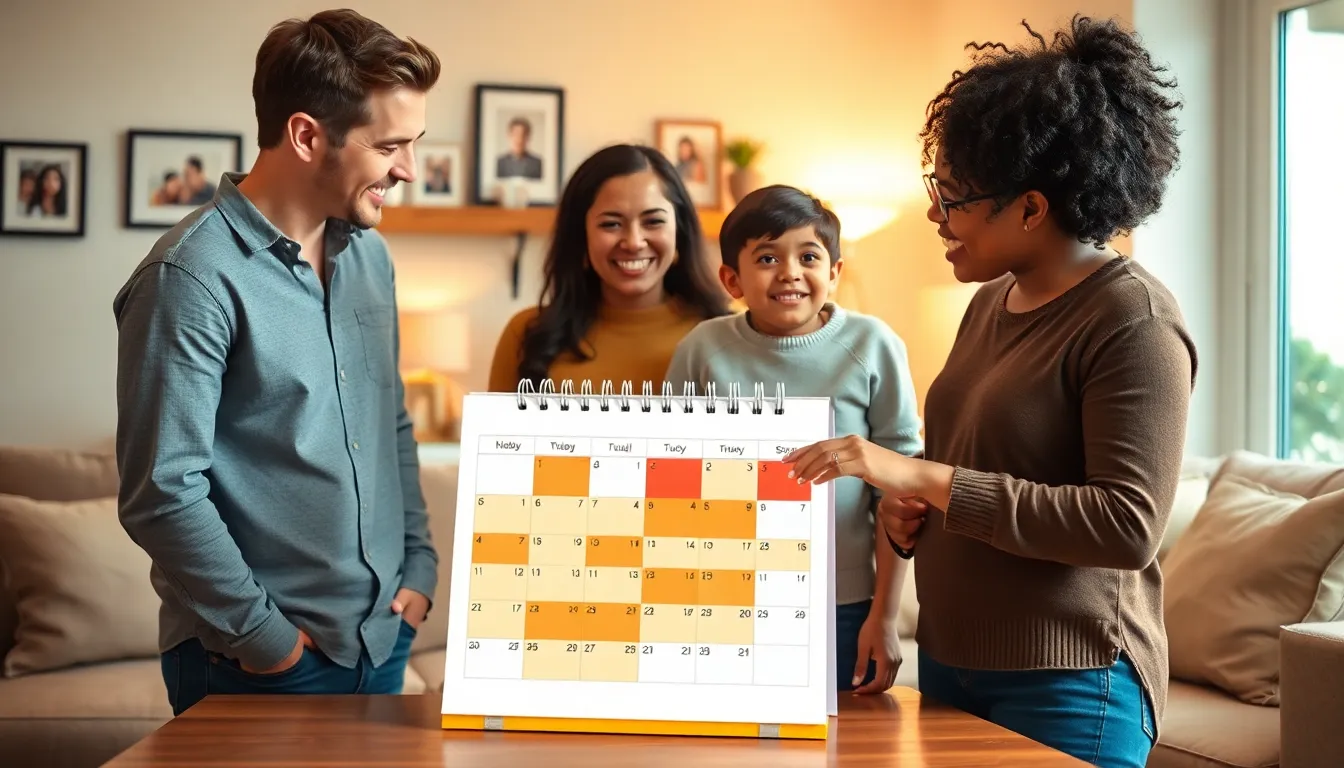Table of Contents
ToggleIn a world buzzing with distractions, finding a routine that resonates on an emotional level can feel like searching for a unicorn at a petting zoo. Yet, emotionally connected routines are the secret sauce to transforming mundane tasks into moments of joy and fulfillment. Imagine sipping your morning coffee while reminiscing about your favorite vacation or winding down with a nightly ritual that leaves you feeling like a zen master.
These routines don’t just add structure to life; they create a tapestry of emotional connections that enrich daily experiences. By infusing personal meaning into everyday activities, individuals can unlock a treasure trove of happiness and purpose. So, why not ditch the robotic grind and embrace a routine that gives a warm hug to the soul? Let’s dive into how emotionally connected routines can elevate life from ordinary to extraordinary.
What Are Emotionally Connected Routines?
Emotionally connected routines blend meaningful practices with daily tasks. These routines create deeper connections to activities, transforming them into sources of joy and fulfillment.
Definition and Importance
Emotionally connected routines refer to practices that infuse daily activities with personal meaning and emotional significance. These routines evoke feelings of happiness and well-being by engaging multiple senses and fostering connection. Importance lies in their ability to counteract monotony. When individuals focus on emotional resonance, routine tasks evolve into reflective experiences. This shift enhances overall well-being and promotes mindfulness. Engaging in emotionally connected routines can significantly improve life satisfaction and enrich daily living.
Examples of Emotionally Connected Routines
Numerous examples illustrate the concept of emotionally connected routines. One common practice involves creating a morning ritual that includes meditation or journaling. This fosters reflection and sets a positive tone for the day. Another example is cooking family recipes, which evoke memories and strengthen bonds during mealtime. Engaging in exercise in beautiful outdoor settings can enhance emotional connection to physical activity. Incorporating gratitude practices into the end-of-day routine creates reflection time on positive experiences. Each example highlights how simple actions, when infused with emotion, transform ordinary routines into extraordinary experiences.
Benefits of Emotionally Connected Routines
Emotionally connected routines offer a variety of advantages that significantly enhance life quality. Individuals can experience numerous benefits, including improved emotional health and stronger relationships.
Enhancing Emotional Well-Being
Emotionally connected routines create a strong foundation for emotional stability. These routines promote mindfulness, allowing individuals to engage fully in the present moment. Increased awareness leads to higher levels of happiness and satisfaction. For example, journaling each morning fosters self-reflection, enabling personal growth and clarity. Participants in gratitude practices often report reduced stress and greater positive emotions. These advantages contribute to an overall sense of well-being and fulfillment.
Strengthening Relationships
Creating emotionally connected routines strengthens bonds with family and friends. Shared activities, like cooking favorite recipes or exercise, encourage quality time and meaningful conversations. Engagement in these shared moments leads to deeper connections and shared memories. Regular family traditions, such as game nights or movie marathons, provide everyone a sense of belonging. Positive experiences during these routines help cultivate trust and support within relationships, enhancing emotional intimacy over time.
How to Create Emotionally Connected Routines
Creating emotionally connected routines involves intentional practices that resonate deeply. By identifying personal values, individuals can shape routines that reflect what truly matters to them.
Identifying Personal Values
Identify core beliefs and passions. Reflect on activities that bring joy and fulfillment. Focus on daily tasks that align with these values to foster a stronger connection. For example, if health is a core value, prioritize cooking nutritious meals or engaging in regular exercise. Considering family as a priority drives bonding moments during shared activities, such as group workouts or family dinners. Assessing what genuinely matters encourages self-awareness and authenticity in everyday routines. This alignment transforms mundane tasks into meaningful experiences that enrich lives.
Incorporating Mindfulness
Incorporating mindfulness into routines enhances emotional connections. Start each day with a few moments of meditation or breathing exercises. Engage fully in activities, whether it’s savoring each bite of a meal or truly listening during conversations. Practicing mindfulness leads to heightened awareness and appreciation of the present moment. For instance, while exercising outdoors, notice the surrounding beauty instead of merely completing a workout. Journaling at day’s end about positive experiences cultivates gratitude and reflection. By fostering mindfulness, individuals can turn ordinary routines into powerful, emotionally charged rituals that promote overall well-being.
Challenges in Establishing Emotionally Connected Routines
Establishing emotionally connected routines presents several challenges that require attention and effort. Individuals often face obstacles that can hinder their ability to create meaningful practices.
Overcoming Resistance
Resistance frequently arises when attempting to change established habits. People may feel discomfort or fear associated with new routines. Identifying triggers is essential for addressing this resistance. Building small, achievable steps into the routine fosters a sense of accomplishment and diminishes the fear of change. Acknowledging feelings during this transition also provides insight into personal barriers. Engaging in self-reflection promotes understanding and eases the path forward.
Maintaining Consistency
Consistency plays a crucial role in developing emotionally connected routines. Individuals sometimes struggle to maintain regularity due to busy schedules or other distractions. Prioritizing time for these routines ensures they remain part of daily life. Setting specific times for activities enhances commitment. Utilizing reminders or accountability partners helps reinforce consistency. Embracing flexibility also benefits individuals, allowing adaptation to changing circumstances while keeping the essence of the routine intact.
Emotionally connected routines offer a powerful way to enrich daily life. By transforming ordinary tasks into meaningful experiences, individuals can cultivate a deeper sense of happiness and fulfillment. These routines not only enhance emotional health but also strengthen relationships through shared activities and mindfulness.
The journey to creating these routines may require effort and commitment, but the rewards are well worth it. With intentionality and reflection, anyone can develop practices that resonate with their core values. As they embrace these emotionally charged rituals, individuals will discover a more vibrant and satisfying existence. Ultimately, the shift from mundane to extraordinary lies in the emotional connections woven into everyday life.







